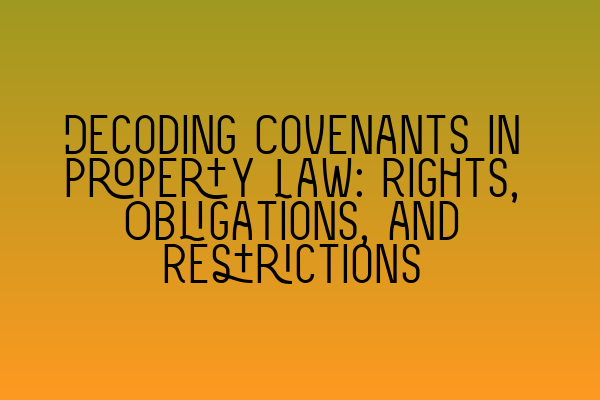Decoding Covenants in Property Law: Rights, Obligations, and Restrictions
In the vast realm of property law, covenants play a significant role in shaping the rights, obligations, and restrictions associated with a property. Whether you’re a buyer, seller, or an aspiring property lawyer, understanding the intricacies of covenants is crucial to navigate through the complex legal landscape. In this informative post, we will decode covenants, explore their various types, and shed light on their implications.
What are Covenants?
Covenants are legally binding agreements that impose certain rights, obligations, and restrictions on property owners. They are typically included in property deeds or contracts and serve to protect the interests of both parties involved. Covenants can be affirmative, requiring the property owner to perform certain actions, or negative, restricting the property owner from engaging in specific activities.
Types of Covenants
1. Affirmative Covenants:
Affirmative covenants, also known as positive covenants, require the property owner to perform certain actions or obligations. These can include maintaining the property in a certain condition, paying homeowners’ association fees, or contributing to the upkeep of communal areas. Affirmative covenants are often found in planned communities or residential developments to ensure a unified and well-maintained environment for all residents.
2. Negative Covenants:
Negative covenants, on the other hand, prohibit property owners from engaging in specific activities or actions. These restrictions are designed to protect the interests of neighboring properties and maintain the harmony and aesthetics of the area. Examples of negative covenants include limitations on building height, restrictions on commercial activities, or rules against certain types of alterations to the property. Breaking negative covenants can result in legal repercussions, including fines or injunctions.
3. Restrictive Covenants:
Restrictive covenants are a specific type of negative covenant that place additional limitations on the use and development of the property. These covenants are often found in housing developments, gated communities, or neighborhoods with specific architectural or aesthetic requirements. Restrictive covenants may dictate the type of materials that can be used in construction, the color of the property, or restrictions on the presence of certain animals or vehicles. Complying with restrictive covenants ensures the property remains consistent with the overall vision of the community and protects property values.
Implications of Covenants
Understanding and adhering to covenants is vital for property owners, as breaching these agreements can lead to legal disputes and financial consequences. When purchasing a property, it is crucial to review the deeds and contracts thoroughly to identify any existing covenants that may affect the use or development of the property. It is advisable to seek legal advice to ensure a comprehensive understanding of the implications of these covenants.
Aspiring property lawyers must possess a sound knowledge of covenants to assist clients in addressing covenant-related issues. Additionally, familiarity with covenants allows lawyers to draft contracts and deeds that adequately protect their clients’ interests.
Conclusion
Decoding covenants in property law is essential for property owners and legal professionals alike. Understanding the rights, obligations, and restrictions imposed by covenants enables property owners to comply with the terms and avoid legal complications. For legal professionals, a strong grasp of covenants is necessary to provide valuable guidance and assistance to clients navigating the complexities of property law.
If you’re preparing for the SQE exams and looking for additional resources to enhance your knowledge, explore our related articles:
– SQE 1 Practice Exam Questions: Test your understanding of property law with our carefully curated practice questions. Click here to access the SQE 1 Practice Exam Questions.
– SQE 1 Practice Mocks FLK1 FLK2: Prepare for SQE 1 with our comprehensive practice mocks designed to simulate the real exam experience. Access the SQE 1 Practice Mocks FLK1 FLK2 here.
– SQE 2 Preparation Courses: Gain a competitive edge in your SQE 2 journey with our specialized preparation courses. Explore the SQE 2 Preparation Courses now.
– SQE 1 Preparation Courses: Get all the support you need to excel in SQE 1 with our comprehensive preparation courses. Discover the SQE 1 Preparation Courses here.
– SRA SQE Exam Dates: Stay up to date with the latest SQE exam dates to ensure your preparation aligns with the examination timeline. Check out the SRA SQE Exam Dates here.
At SQE Property Law & Land Law, we strive to provide aspiring property lawyers with the resources and guidance they need to excel in their legal journey. Stay tuned for more informative posts on various aspects of property law.
